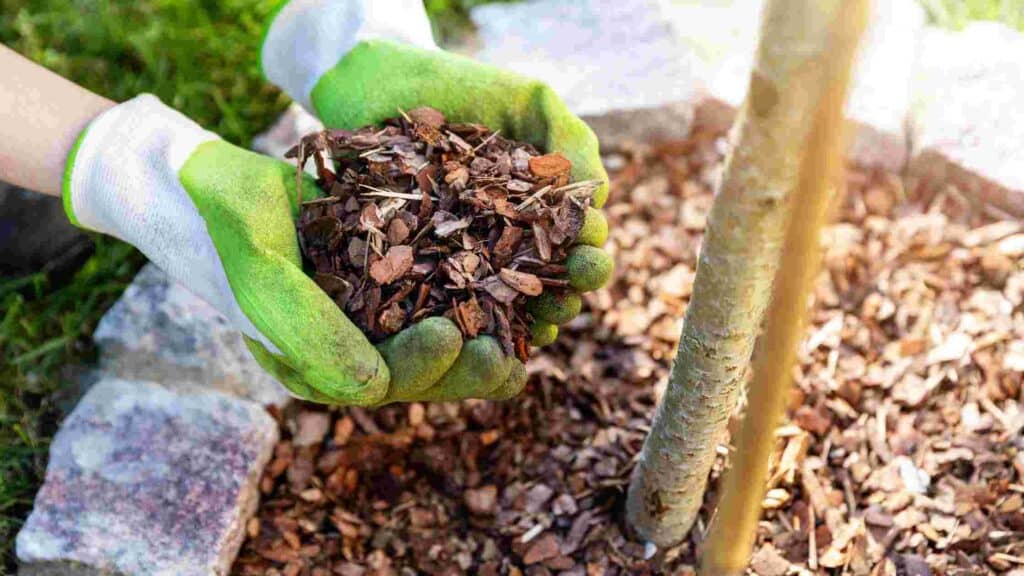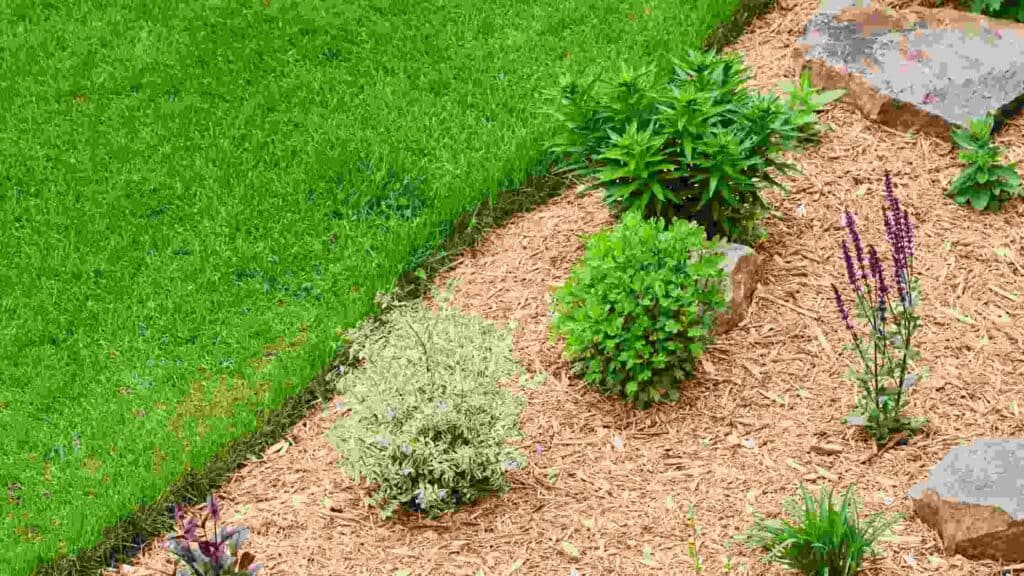Ah, the wonders of mulch – it’s helpful in the garden, saving the day by keeping soil happy and plants thriving. Let’s talk about something a bit more…heated. Is mulch flammable?
It’s time to get to the root of this burning question.
Is Mulch Flammable?
If you pile on that mulch too high – more than a few inches – things can get a bit hot under the collar and mulch can catch fire! (You may also be interested in finding out how deep should mulch be)
But mulch doesn’t just burst into flames for no reason. Certain conditions increase the risk of mulch fires. For example, a dry spell without much rainfall, combined with scorching temperatures and gusty winds.
So, be extra cautious in late spring and summer when things get hot (find out when is the best time to mulch).
What Causes Mulch To Catch Fire?
Mulch and cigarettes don’t mix well – it’s like putting fuel next to a match. If you leave those smoky sticks in or around your mulch, you’re playing with fire – literally!
And speaking of playing, if you pile mulch too close to your home or let it touch your house, you’re asking for trouble. One slip-up and your house could be at risk if that mulch decides to ignite.
According to research, rubber mulch catches flames quickly. Shredded mulch is no slouch either – it’s not far behind when it comes to quick ignitions. So, handle these with care!
Here’s a pro tip: once mulch catches fire, it’s tough to tame. So, let’s be safe and keep those mulch flames at bay.
Preventing Mulch Fires

Let’s talk about how you can prevent mulch fires and keep your garden secure and sound!
1. Give Space And Room To Breathe
Mulched garden beds need to be at least 18 inches away from combustible materials and electrical devices like decorative lighting.
Keep fertilizers, gas cans, and pesticides far from the mulch zone. They’re like the fire’s entourage, accelerating the risk.
2. Stay Alert During Hot & Dry Weather
When the sun blazes and the air turns dry, it’s time to be on high alert. Hot and dry weather can turn the mulch into a potential fire starter. So, keep an eye on your garden, especially during these conditions.
3. Keep Mulch Moist In Hot Weather
Keep those garden beds hydrated, especially in hot weather. Dark mulch can absorb a lot of heat, turning into a toasty playground for potential fires. Moist mulch stays cooler, which is safer.
4. Don’t Smoke Near Mulch
Remember, your cigarette butts and matches belong in proper receptacles, not the ground near mulch.
Smoking materials carelessly discarded in mulched beds can cause massive fires, leading to a tragic loss of life and property damage worth millions.
5. Non-Combustible Mulch
Around your gas meter and near any combustible parts of your home or structure, go for non-combustible mulch like pea gravel or rock.
6. Mulch Moderation
Keep your mulch layer between 2 to 4 inches to reduce the risk of spontaneous combustion. Large heaps of mulch mixed with cool air can produce steam, and that’s not what we want.
Thinner-spread mulch keeps the heat in check and lowers the fire risk. If your area is prone to wildfires, consider using gravel mulch instead of wood mulch. It’s a safer bet.
You may also be interested in checking out: How often should you replace mulch?
7. Spotting Smoking Mulch
If you see any mulched bed smoking, be a quick firefighter – put it out if you can. Let the property owner know if you’re not the one, or call 911 if needed.
8. River Rock Around Your Home
A smart move is to add a 10-20 inch strip of decorative river rock around your house. It acts as a protective firewall between your home and the mulch.
Bonus points: it also keeps mold and rot at bay from decomposing mulch. Double win!
Also read: Does mulch attract bugs?
9. Opt for Safer Stone Mulch
Living in a hot and dry climate? Stone mulch is your cooler option, lowering the fire risk significantly.
10. Keep Fire Away From Mulched Beds
Fire pits, fireworks, and outdoor candles should be kept far away from mulched garden beds.
Non-Flammable Mulch Alternatives: What Mulch Is Not Flammable?

Not all mulches are fire-starters.
Here’s a list of the more fire-resistant ones:
- Cocoa shells
- Brick chips
- Sod
- Shredded hardwood
- Large pine bark nuggets
The Slow Burners: Organic Mulches
Let’s not forget about our slow burners – the organic mulches like shredded pine bark.
These types take their time before they ignite, usually after weathering on the ground for six months or more. So, you’ve got a bit more breathing room with them.
FAQs
1. Is garden mulch a fire hazard?
Yes, garden mulch can be a fire hazard, especially if it’s dry and exposed to heat sources like sunlight.
2. Is landscaping mulch flammable?
Landscaping mulch can be flammable, especially if it’s made from dry, organic materials like wood chips or bark.
3. Can mulch catch fire from the sun?
Mulch can catch fire from the sun’s heat, particularly if it’s dry and the temperatures are high.
4. How to put out a mulch fire?
To put out a mulch fire, use water to douse the flames thoroughly. If it’s a larger fire, contact your local fire department for assistance.
5. Is bark mulch a fire hazard?
Bark mulch can be a fire hazard, particularly when dry and exposed to heat sources.
6. What is mulch made of?
Mulch is typically made of organic materials such as wood chips, bark, straw, leaves, or compost (for more details, check out what is mulch).
7. Why is my mulch pile smoking?
A smoking mulch pile indicates that it might be too dry and heating up, which can potentially lead to a fire. It’s important to monitor and keep it adequately moist to prevent ignition.
Conclusion: Can Mulch Catch Fire?
Mulch is a great addition to your garden, but it’s essential to handle it with care.
Remember, gravel and rock mulches are the safest bet for home use. Other mulches can still be used safely by applying them thickly and outlining them with rock.
With these safety measures in place, your garden sanctuary will remain a haven of beauty and peace – just the way it should be!
